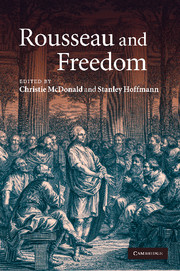Book contents
- Frontmatter
- Contents
- List of illustrations
- Notes on contributors
- Acknowledgments
- List of abbreviations
- Introduction
- PART I
- PART II
- PART III
- 14 Paranoia and freedom in Rousseau's final decade
- 15 Freedom and the project of idleness
- 16 On the uses of negative freedom
- 17 Fail better: Rousseau's creative délire
- Postface: Rousseau and freedom
- Bibliography
- Index
16 - On the uses of negative freedom
Published online by Cambridge University Press: 05 May 2010
- Frontmatter
- Contents
- List of illustrations
- Notes on contributors
- Acknowledgments
- List of abbreviations
- Introduction
- PART I
- PART II
- PART III
- 14 Paranoia and freedom in Rousseau's final decade
- 15 Freedom and the project of idleness
- 16 On the uses of negative freedom
- 17 Fail better: Rousseau's creative délire
- Postface: Rousseau and freedom
- Bibliography
- Index
Summary
I do not think that one can seek the source of moral evil anywhere but in a free, perfected, thus corrupted man.
Jean-Jacques Rousseau, Letter to VoltaireThe publication, in 1762, of the Social Contract and Emile precipitated a series of official judgments against Jean-Jacques Rousseau. The works were banned or burned throughout Europe, from Catholic Rome to liberal Amsterdam. The Paris Parliament that condemned Emile also ordered its author to be arrested and jailed in the Paris Conciergerie. Refutations of Rousseau's ideas began to appear everywhere. Private letters meant for public consumption, and works discussing his ideas point by point circulated freely. The officious Madame Du Deffand wrote:
I have no sympathy for Jean-Jacques. He would return everything to chaos; I have never seen anything more contrary to common sense than his Emile, nothing more contrary to morals than his Héloïse, and nothing more boring and obscure than his Social Contract.
In the Confessions, Rousseau narrated in detail the flight that followed the official censure of his works and the calls for his arrest. The rest of the story is well known, and offered Rousseau seemingly infinite opportunities to describe both the vast plot he imagined against him and the animosity he truly encountered during his years of wandering: “Here begins the work of darkness in which I have found myself enshrouded for the past eight years,” he writes at the beginning of Book xii of the Confessions.
- Type
- Chapter
- Information
- Rousseau and Freedom , pp. 257 - 273Publisher: Cambridge University PressPrint publication year: 2010

